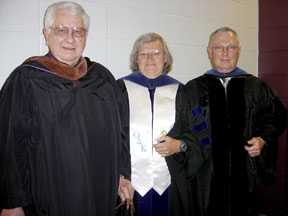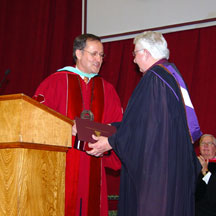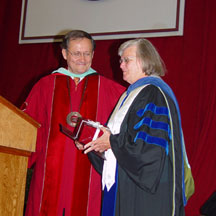

Centenary
News Service
2911 Centenary
Boulevard
Post Office
Box 4188
Shreveport
Louisiana
71134-1188
Telephone
318 869-5120
Fax
318 841-7266
Email
news@centenary.edu
FOR IMMEDIATE RELEASE (5/05)
Contact: Lynn Stewart, Centenary News Service, 318-869-5120
Centenary Honors Three Retiring Faculty Members: Bedard, Buseick, Seidler
 Centenary retirees: Bob Buseick, professor of theatre; Rosemary Seidler, professor of chemistry; and David Bedard, professor of health and exercise science. |
|
SHREVEPORT, LA — Centenary College of Louisiana honored three retiring faculty members whose combined service totaled 99 years during the college's annual commencement exercises May 7 in the Centenary Gold Dome.
Retirees are David Bedard, professor of health and exercise science; Bob Buseick, professor of theatre, and Rosemary Seidler, professor of chemistry.
Centenary President Kenneth L. Schwab presented each with a citation and college gift after the reading of the following citations by Provost Darrel D. Colson:
David Lawrence Bedard
.jpg) Dr. David Bedard (right), professor of health and exercise science, is recognized upon his retirement after 24 years at Centenary as President Kenneth L. Schwab looks on. |
|
"A native Texan, David Bedard, who is barely old enough to retire, does so after 24 years at Centenary. He earned a Master of Education degree in physical education from Northwestern State University of Louisiana and the doctorate in education from Texas A & M University before joining the Centenary faculty as an assistant professor of health and physical education in 1981.
"As an undergraduate at Northwestern State University in Nachitoches, David was a star gymnast. He was twice a National Association of Intercollegiate Athletics National Tumbling Champion, and for three years--1966, 1967, and 1968--he was a member of the NAIA First Team All-American Gymnastics Team.
"Following graduation, he served for three years in the United States Army and saw combat in Vietnam.
"Here at Centenary David has worn many hats. First and foremost an educator, he has taught a variety of courses in health and exercise science. He also served for three years, from 2000-2003, as the Director of Athletics. Thanks to his leadership Centenary saw significant improvements to its athletic facilities, the addition of men's and women's swimming as varsity sports, and an increase in the GPA of varsity athletes. Most notably, Centenary obtained membership in the Mid-Continent Conference.
"It is a measure of the esteem in which he is held by his colleagues and their trust that David has represented faculty on every major committee. He has been an exemplary Centenary citizen.
"An active member of the Louisiana Association for Health, Physical Education, Recreation and Dance—at whose conferences he has presented many papers and in whose journal he has published many articles—David now means to turn his hand to a personal account of his military service in Vietnam. In this enterprise we wish him luck, knowing that David has at least two aids to success: the editorial guidance of a Centenary graduate in English, his daughter Emily; and the natural ability, made more acute by a sly sense of humor, to tell a story well."
Robert Reid Buseick
 President Kenneth L. Schwab makes a presentation to Professor Bob Buseick, who retires after 36 years in the Theatre Department. |
|
" Robert Reid Buseick—Bob Buseick—came a long way to join the Centenary faculty 36 years ago. He completed his undergraduate education at Eastern Oregon University. Thereafter he studied for a year in London, at the Central School of Speech and Drama. He received his Master of Fine Arts degree from the University of Portland in 1964.
"Following a stint in Oregon's public schools (where he taught math and science as well as speech and theatre), he joined the Centenary College faculty as the chair of Theatre in 1969. As one of his colleagues observes, Bob has become--in fact, he became early in his tenure here—a 'theatre icon' in Shreveport.
"For almost four decades at Centenary, he has distinguished himself as the director of a consistently adventurous repertoire. His directorial ambition led him to assault the battery of plays by Tennessee Williams. To the best of our knowledge, he was the first director in this area—the first white director anyway—to cast an African-American in a dramatic role. He was the first director in the region to stage a play about AIDS. He brought the summer musical to Centenary—to Shreveport.
"All of this has won him a loyal community audience and brought him and his students and colleagues innumerable awards. For his intrepid commitment to a progressive theatre that embraces the more provocative issues of our time, Bob received the American Civil Liberties Union's 1999 Freedom Fighter Award.
"The result for Bob's students has been success in a variety of professions. Graduates in theatre from Centenary have toured professionally with productions all over the planet. They have worked on Broadway and in film in Los Angeles—as writers as well as actors. Innumerable teachers in high schools throughout the Ark-La-Tex are graduates of his program. There are also attorneys and one local judge.
"As he retires from teaching and directing at Centenary, Bob Buseick is definitely not leaving the theatre. In fact, we should not call his departure from Centenary his 'retirement.' As the director of a professional equity theatre, another "first" for Shreveport, the Red River Players, may he resume that assault heroic on Tennessee Williams; and may whatever new ambitions he pursues be adventures also for us."
 Dr. Rosemary Seidler, professor of chemistry who retires after 39 years at Centenary, receives a citation and gift from President Kenneth L. Schwab. |
|
Rosemary Seidler
"Rosemary Seidler retires after 39 years of active participation
in the life of Centenary College. A native of New Orleans, she received
her Bachelor of Science degree in chemistry from Loyola; upon receiving
her Ph.D. in analytical chemistry from Tulane in 1966, she joined the
Centenary faculty.
"Her involvement for almost four decades in the life of the College is becoming legend. Few here will remember her in pigtails. One longtime colleague who does—he himself boasts over three decades of service—also recalls an on-campus softball game in which she was pitching, and he came up to bat. He hit the ball, which then smacked her. He raced to first base, where a now legendary coach observed to this rookie professor, 'You want to watch out for her; that lady is tough. The ball hit her leg, and she didn't even rub it.'
"Tough she may be, but her approach to her students, as another longtime colleague insists, is 'maternal': 'She takes students under her wing and mentors them.' Indeed, her career as a teacher has been distinguished by her commitment to liberal education—the popular Chemistry and Society, a course for non-science majors, has regularly figured in her schedule—and by her commitment to advising. A recipient of Centenary's Outstanding Teacher Award, she was also one of 12 recipients nationwide of a 1993 Outstanding Advising Award from the National Academic Advising Association. Another longtime colleague points out that students have Rosemary Seidler to thank for their inclusion in college governance.
"Her other indisputable contribution to Centenary is her capacious memory. On committees—she has served on every major committee—and at monthly faculty meetings, she has functioned as an unofficial historian of college policies—often to the grief of administrators and young Turks on the faculty. Those meetings won't be the same without Rosemary.
"An avid birdwatcher, Rosemary has—or so we've heard—stripped the gears of a Jeep while tearing up the back roads of Alaska in pursuit of some rare sight. Now such adventures can be had no farther afield than Arkansas, where sightings of the ivory-billed woodpecker, long thought extinct, were officially confirmed last week. If sightings of Rosemary herself must now become increasingly rare on the Centenary campus, may she never become any more 'extinct' than that legendary 'Lord God' bird."
- 30 -